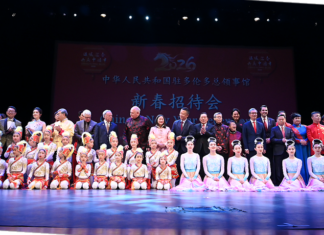ALLISTON — From mining critical minerals to building cars and batteries, Canadian businesses and workers are attracting historic investments to help secure and create jobs, grow our economy, and keep our air clean. In the last four years, automotive and battery makers have announced more than $31 billion in investments in electric vehicle manufacturing across Canada. They want a reliable partner with world-class talent, and this is exactly what we have to offer.
And the world is taking notice.
The Prime Minister, Justin Trudeau, and the Premier of Ontario, Doug Ford, today welcomed Honda Canada’s milestone investment of approximately $15 billion to create Canada’s first comprehensive electric vehicle supply chain, located in Ontario.
This large-scale project will see four new manufacturing plants in Ontario. Honda will build an innovative and world-class electric vehicle assembly plant – the first of its kind for Honda Motor Co. Ltd. – as well as a new stand-alone battery manufacturing plant at Honda’s facilities in Alliston, Ontario. To complete the supply chain, Honda will also build a cathode active material and precursor (CAM/pCAM) processing plant through a joint venture partnership with POSCO Future M Co., Ltd. and a separator plant through a joint venture partnership with Asahi Kasei Corporation. Once fully operational in 2028, the new assembly plant will produce up to 240,000 vehicles per year.
Honda’s investments in an electric vehicle assembly plant and a battery manufacturing plant in Alliston will create over one thousand well-paying manufacturing jobs in Ontario, with the CAM/pCAM processing plant and separator plant helping to create thousands of additional direct and indirect jobs in Ontario and across Canada, including during the construction phase and across Ontario’s leading auto parts supplier and research and development ecosystems.
This investment is a strong vote of confidence in Canada and Ontario’s highly skilled workers, strong economies, and competitive business environments.
Canada’s auto sector has been an engine of economic growth, driving innovation and creating good middle-class jobs. As the demand for electric vehicles continues to grow, we will attract even more investment and position our auto, battery manufacturing, and battery material production industries as global leaders across the entire electric vehicle supply chain, to create economic growth and opportunities now and for generations to come.

- In Budget 2024, the federal government announced its intention to introduce the new 10 per cent electric vehicle (EV) Supply Chain investment tax credit, to attract investment across at least three supply chain segments:
- EV assembly.
- EV battery productions.
- Cathode active material production.
- The new EV Supply Chain investment tax credit is the government’s sixth major economic investment tax credit and complements the 30 per cent Clean Technology Manufacturing investment tax credit. The government is focused on delivering all major economic investment tax credits on a priority basis.
- It is estimated that Honda’s new investments in eligible EV supply chain segments could benefit from federal support in the range of $2.5 billion through the proposed EV Supply Chain investment tax credit and the proposed Clean Technology Manufacturing investment tax credit. In addition, the Government of Ontario will provide support of up to $2.5 billion for these segments through various direct and indirect incentives. Planning for Honda’s new facilities in Alliston is expected to be finalized in the next six months, at which point the company will release additional details. Honda, the Government of Canada, and the Government of Ontario are working together to support this project through various direct and indirect incentives.
- Honda’s proposed full EV supply chain will include a new CAM/pCAM processing facility through a joint venture partnership with Korean battery materials company POSCO Future M Co., Ltd. as well as a new separator facility through a joint venture partnership with Japanese chemical company Asahi Kasei Corporation. Both of these facilities will be located in Ontario, with announcements to follow in their respective communities.
- This project is part of Honda’s efforts to achieve carbon neutrality. The company is targeting sales of 100 per cent zero-emission EVs in North America by 2040.
- Honda is a global automotive industry leader headquartered in Tokyo, Japan. The company was the first Japanese automaker to produce cars in Canada. It established Honda Canada in 1969 and started production in Alliston, Ontario, in 1986. These facilities – Honda’s only manufacturing facilities in Canada – currently include two auto plants and one engine plant. They have the capacity to produce more than 400,000 vehicles and 190,000 engines annually. The company employs over 4,200 people in Alliston and has a network of more than 280 dealerships across the country.
- The governments of Canada and Ontario previously made matching investments of $131.6 million to help Honda Canada retool its manufacturing operations in Alliston for the next generation of hybrid EVs.
- This is the latest in a series of historic investments Canada has attracted across our EV supply chain, from mining to manufacturing. With Honda’s new project, these investments now total more than $46 billion since 2020. They also include, among others:
- $7 billion for a new EV battery manufacturing facility built by Northvolt Batteries North America in Saint-Basile-le-Grand and McMasterville, Quebec.
- $7 billion for Volkswagen’s first overseas EV battery manufacturing plant, in St. Thomas, Ontario.
- Over $5 billion from Stellantis and LG Energy Solution to create a joint venture for the manufacturing of EV batteries in Windsor, Ontario.
- $1.8 billion for Ford’s repurposed battery-EV production plant at its Oakville Assembly Complex, in Ontario.
- $1.5 billion for Umicore to build a new world-leading net-zero facility in Loyalist Township, Ontario, which will produce essential components of EV batteries.
- $1.2 billion for a new battery materials production plant in Bécancour, Quebec, built by a consortium formed by the Ford Motor Company and South Korea’s EcoProBM and SK On.
- $600 million for a CAM facility to be built by a joint venture between General Motors and POSCO Future M Co., Ltd. in Bécancour, Quebec.
- Budget 2023 introduced a refundable Clean Technology Manufacturing investment tax credit to cover 30 per cent of costs in new machinery and equipment used to manufacture or process clean technologies and extract, process, or recycle key critical minerals.
- Canada’s automotive sector builds more than 1.5 million vehicles each year – one every 21 seconds. It supports nearly 550,000 direct and indirect jobs, contributed $18 billion in 2023 to Canada’s gross domestic product, and is one of the country’s largest export industries. It is anchored by the presence of five automotive manufacturers: Stellantis, Ford, General Motors, Toyota, and Honda.
- Transportation accounts for about a quarter of our emissions in Canada. That’s why the Government of Canada has an ambitious target of 100 per cent zero-emission vehicle sales by 2035, coupled with a suite of support measures from charging infrastructure to purchase incentives.
- It is projected that the global sales of EVs will be over three times higher in 2030 than it was in 2023, and Canada is well positioned to be a major player in EV production.








